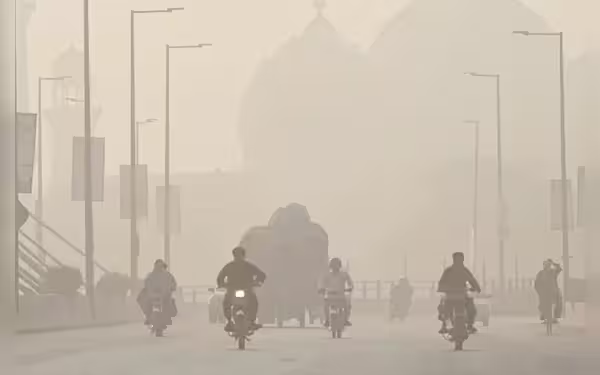Saturday, November 16, 2024 07:07 PM
Punjab Enforces 8 PM Market Closure to Combat Smog Crisis
- Punjab mandates market closure by 8 PM to reduce smog.
- Outdoor activities restricted in smog-hit districts.
- Government aims to improve air quality and public health.
 Image Credits: pakobserver.net
Image Credits: pakobserver.netPunjab government enforces 8 PM market closure to combat severe smog and improve air quality in affected districts.
The province of Punjab, facing severe air pollution challenges, has taken decisive action to combat the worsening smog crisis. In a recent announcement, the Punjab government has mandated that all markets in Lahore and other districts affected by smog must close by 8 PM. This measure aims to reduce outdoor activities that contribute to air pollution, particularly during the evening hours when smog levels tend to rise.
In addition to the early closure of markets, the Punjab government has imposed restrictions on all outdoor activities. This includes sports events, exhibitions, festivals, and dining experiences that extend beyond 8 PM. The decision comes in response to alarming air quality reports, which have indicated that critical air pollution events have also been recorded in other major cities such as Faisalabad, Multan, and Gujranwala over the past week.
The smog crisis in Punjab is not a new phenomenon; it has been a recurring issue, particularly during the winter months. Factors contributing to this environmental challenge include vehicular emissions, industrial discharges, and crop burning in surrounding agricultural areas. The government’s proactive measures are essential to safeguard public health and improve air quality for residents.
While these restrictions may seem inconvenient to many, they are crucial for the well-being of the population. Poor air quality can lead to serious health issues, including respiratory problems and cardiovascular diseases. By limiting outdoor activities and reducing pollution sources, the government hopes to create a healthier environment for all.
As citizens of Punjab adapt to these new regulations, it is important to recognize the collective responsibility in tackling air pollution. Everyone can contribute by minimizing the use of vehicles, supporting local initiatives aimed at reducing emissions, and advocating for cleaner practices in industries. Together, these efforts can lead to a significant improvement in air quality, ensuring a safer and healthier future for the people of Punjab.













